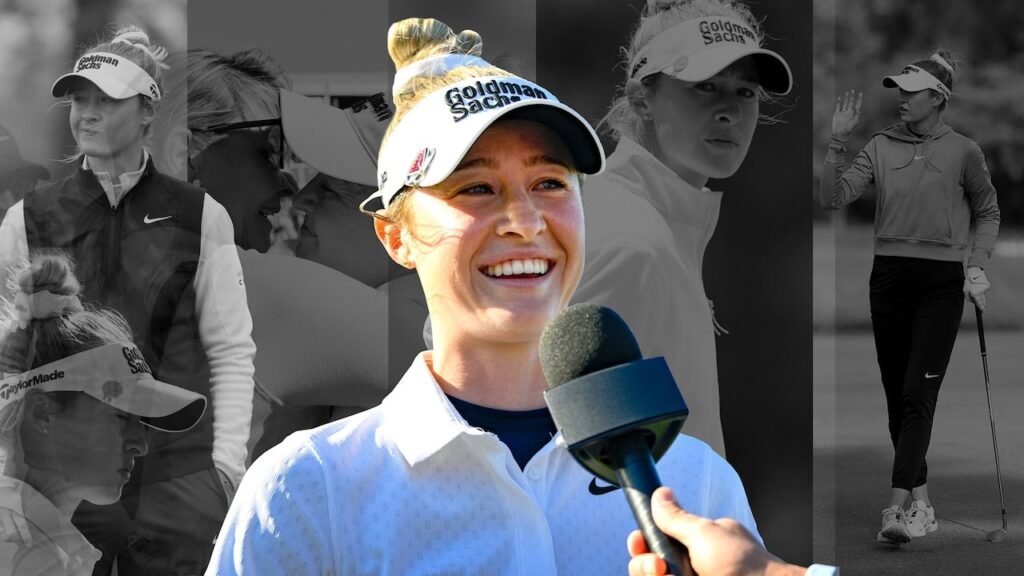The Unknowable Nelly Korda: What does the superstar owe her sport?
“Your job as a top player is to help build this tour.”
—Stacy Lewis, to Golfweek, in 2022
Christina Kim does not accept the premise. The 22-year LPGA veteran is a Nelly Korda supporter, full stop, even as she jokes that she has been on tour almost as long as Korda has been alive. The concept that Korda should be doing more than simply tearing up the circuit at a historic rate—she comes into this week’s U.S. Women’s Open having won six of her last seven starts and is the favorite at Lancaster (Pa.) Country Club—strikes Kim as absurd.
“I’ve always been a fan of people being true to who they are,” Kim said. “And Nelly Korda is, in a word, chill. What’s wrong with someone finding joy and happiness in what they do, and having that sense of wholeness in who they are?”
As to the concept that she’s leaving exposure on the table, Kim balks.
“If anything, she’s the perfect ambassador for our game,” she said. “She has integrity, she will absolutely murder you on the golf course, and there’s no gamesmanship, no snark. She has a good and kind soul.”
This rousing endorsement of Korda can be seen as Exhibit A for the defense. Pitted against that perspective is the quiet but growing concern in certain corners of women’s golf that Korda does bear a deeper responsibility for promoting her sport, and that by resisting a bigger stage—turning down media opportunities both small and massive, and maintaining a wary distance in those she accepts—she has failed to capitalize on an unprecedented moment. And Kim’s perspective as a colleague is different from what you might hear from those in marketing or the media. What she sees as “chill,” others see as insularity or detachment. Both arguments have their compelling points, and definite answers are hard to come by.
Team Korda opted not to participate in this story, which is fair enough; she’s not the first high-profile athlete to turn down an interview around an important event. What’s remarkable about the Korda team writ large, though, is how effectively they’ve built a wall around themselves, how tough it is to penetrate that wall even for journalists who have worked the LPGA beat for years and how their emphasis on privacy clashes with her emergence in 2024 as a superstar in a sport that greatly craves exposure.
She is the greatest player in today’s game by far, and she may be on a journey to becoming one of the greatest ever. Yet in a social media age, at a boom time for women’s athletics, the 25-year-old has defied the odds and remained a cipher even within professional golf.
Korda’s hope is that on-course success is enough.
“I’m just out here doing what I love and hopefully that’s what grows the game naturally,” she said in May. “I’m not trying to push anything. I hope that people see me for who I am and that I love this game.”
But what if, as some contend, that’s not enough? What if women’s golf needs not just dominant victories, but a dynamic superstar, its own version of Tiger Woods? There are inevitable comparisons made to Caitlin Clark—google the phrase “Caitlin Clark moment” with “Nelly Korda” to experience the deluge—but Clark carries herself with an engaging swagger that seems to perfectly align with the surge of women’s sports. That’s not Korda, and whispers that it should be, that she should flip a personality switch for the betterment of the women’s game, sound optimistic to the point of delusion. To many like Kim, it also feels unfair.
The Unknowable Nelly Korda: What does the superstar owe her sport?
“Your job as a top player is to help build this tour.”
—Stacy Lewis, to Golfweek, in 2022
Christina Kim does not accept the premise. The 22-year LPGA veteran is a Nelly Korda supporter, full stop, even as she jokes that she has been on tour almost as long as Korda has been alive. The concept that Korda should be doing more than simply tearing up the circuit at a historic rate—she comes into this week’s U.S. Women’s Open having won six of her last seven starts and is the favorite at Lancaster (Pa.) Country Club—strikes Kim as absurd.
“I’ve always been a fan of people being true to who they are,” Kim said. “And Nelly Korda is, in a word, chill. What’s wrong with someone finding joy and happiness in what they do, and having that sense of wholeness in who they are?”
As to the concept that she’s leaving exposure on the table, Kim balks.
“If anything, she’s the perfect ambassador for our game,” she said. “She has integrity, she will absolutely murder you on the golf course, and there’s no gamesmanship, no snark. She has a good and kind soul.”
This rousing endorsement of Korda can be seen as Exhibit A for the defense. Pitted against that perspective is the quiet but growing concern in certain corners of women’s golf that Korda does bear a deeper responsibility for promoting her sport, and that by resisting a bigger stage—turning down media opportunities both small and massive, and maintaining a wary distance in those she accepts—she has failed to capitalize on an unprecedented moment. And Kim’s perspective as a colleague is different from what you might hear from those in marketing or the media. What she sees as “chill,” others see as insularity or detachment. Both arguments have their compelling points, and definite answers are hard to come by.
Team Korda opted not to participate in this story, which is fair enough; she’s not the first high-profile athlete to turn down an interview around an important event. What’s remarkable about the Korda team writ large, though, is how effectively they’ve built a wall around themselves, how tough it is to penetrate that wall even for journalists who have worked the LPGA beat for years and how their emphasis on privacy clashes with her emergence in 2024 as a superstar in a sport that greatly craves exposure.
She is the greatest player in today’s game by far, and she may be on a journey to becoming one of the greatest ever. Yet in a social media age, at a boom time for women’s athletics, the 25-year-old has defied the odds and remained a cipher even within professional golf.
Korda’s hope is that on-course success is enough.
“I’m just out here doing what I love and hopefully that’s what grows the game naturally,” she said in May. “I’m not trying to push anything. I hope that people see me for who I am and that I love this game.”
But what if, as some contend, that’s not enough? What if women’s golf needs not just dominant victories, but a dynamic superstar, its own version of Tiger Woods? There are inevitable comparisons made to Caitlin Clark—google the phrase “Caitlin Clark moment” with “Nelly Korda” to experience the deluge—but Clark carries herself with an engaging swagger that seems to perfectly align with the surge of women’s sports. That’s not Korda, and whispers that it should be, that she should flip a personality switch for the betterment of the women’s game, sound optimistic to the point of delusion. To many like Kim, it also feels unfair.


